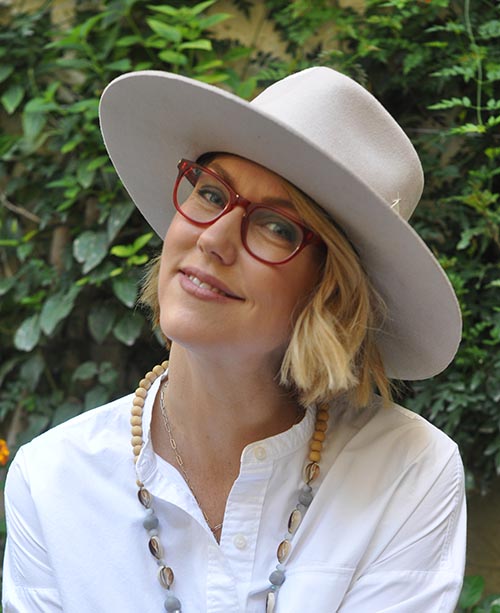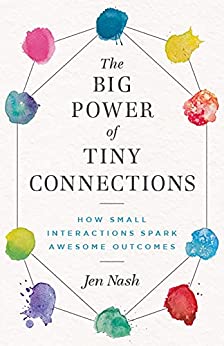Welcome to Uncaged! In your book, The Big Power of Tiny Connections, you talk about how even the smallest connections can have a big impact on your life. What do you hope for readers to take away from reading this book?
I want to remind you, or anyone reading my book, that everyone we meet has the power to change our lives and in turn, we have the power to change theirs. I’m talking about the guy standing in line next to you, grabbing a coffee at your local coffee house, or the women sitting next to you at the theatre Knowing that, would you want to connect with them in some way? Talk to them? Interact in some small way to see what awesomeness you can spark? I hope so. Because my book is packed with really fun stories as well as data that supports my belief that we’re wired for connection and it’s the most powerful thing we can do for our health and wellbeing.
Are you planning on other books in the future?
Absolutely. There are several ideas I’ve been thinking about but I’m not ready to share them just yet, so by all means stay tuned.
What behind-the-scenes tidbit in your life would probably surprise your readers the most?
After I finished a total re-write of the book and while I was working with my developmental editor —I went through a horrible breakup. My relationship with my fiancé exploded and I had to shelve the book for about 8 months while I moved and got my head on straight. I knew publishing the book was very important to me and my healing, so to some degree getting the book through all the rounds of copy editing and proofreading was part of my healing process.
What was the motivation behind this book?
You want the truth? Ha! I love this question. I would say that initially the motivation was to make my mom proud. She’d bugged me my whole life to write a book and I thought maybe after she passed away in 2015, that I would lose the drive to do it. But I didn’t. So during covid, working with Authors Who Lead, a writing initiative fun by some amazing and empathetic humans, I really honed in on my unique personality traits. I focused on what made me—me? My passion for connecting with the world around me really stood out as my superpower.
As the book took shape, my motivations evolved from being less selfish and more altruistic. Pretty soon I realized that I truly wanted to help others get more out of their lives by inspiring them to see their interactions with the world in a new light, and to inspire them to take more risks when it came to connecting with anyone and everyone around. If my mom were still alive she’d be super proud of this accomplishment and I look forward to toasting with her on the other side, sometime in the future.
Please read the rest of the interview in the issue below
 By the time Jen Nash was 18, she’d already moved ten times, landing in different cities in Canada before moving to Malaysia, Hong Kong, Japan, Australia, and the United States. All this globe-trotting gave Jen a sense of urgency when it came to making friends and connections.
By the time Jen Nash was 18, she’d already moved ten times, landing in different cities in Canada before moving to Malaysia, Hong Kong, Japan, Australia, and the United States. All this globe-trotting gave Jen a sense of urgency when it came to making friends and connections.
Over the past twenty years, Jen has had the privilege of co-founding a digital agency that went from 1.1M in revenue to over 15M in three years. Building a multi-million-dollar real estate portfolio and working as a writer and strategist for some of the biggest Fortune 50 companies in the world. In 2017 she became the CEO of a cryptocurrency start-up before transitioning into coaching full-time.
In 2022, leveraging her understanding of how powerfully important small connections can be, Jen wrote the book: The Big Power of Tiny Connections—How Small Interactions Spark Awesome Outcomes. Today she calls herself a Connector in Chief and Executive Coach. She is currently focused on supporting high-net-worth female clients embrace their abundance for maximum impact and running powerful corporate trainings for companies focused on improving presentation skills, human connection, culture, and employee retention rates.
jennash.com
 The Big Power of Tiny Connections
The Big Power of Tiny Connections
Jen Nash
Motivational
“This book explains how even the smallest connections have the power to change your life forever. It’s not only a must-read — it’s a fun read.”—Allison Graham, Keynote Speaker & Author of Take Back Your Weekends
Using hilarious true-life stories alongside snippets of insightful research, Jen Nash underscores how powerfully connection supports our happiness, health, and well-being, while also sharing practical ways you can find and make connections on a daily basis—almost anywhere. Whether you want to go to more parties, get a better job, make more money, or get laid more—reading this book can give you practical strategies for doing it all. A happier, more successful, and more fulfilling life is within your reach and The Big Power of Tiny Connections will show you the way.
Excerpt
CHAPTER TWO:
“I Don’t Need More Friends” and Other Lies We Tell Ourselves
Most humans are not always up for talking to new people. We tell ourselves that “we don’t need more friends or connections” in order to avoid having potentially awkward encounters with that little-known human species, humanis-strangis. However, as discussed in the last chapter, positive psychology makes a strong case that social relationships are the single most important predictor of people’s well-being, and that people—with their powerful need to belong to social groups—cannot feel their best or be at their healthiest without having awesome, connective, and meaningful social relationships1. When people have more conversations, they report increased feelings of happiness. Happy people tend to engage others more, so the cycle continues! It’s not just when you’re talking to friends or family, either—it turns out that chatting up a stranger is also good for your health2.
What’s Really Holding Us Back?
Behavior change doesn’t happen because a study says it should. We need to get to the root of our discomfort and tackle our fears one by one. Our concerns run much deeper than “I don’t need more friends.” Most of us have totally logical concerns when it comes to mingling with the unknown. The top fears most of us experience when even contemplating talking to humanis-strangis revolve around our fear that:
• we won’t know how to start a conversation
• we won’t enjoy talking to the stranger
• we won’t like the stranger
• we’ll run out of things to say
• they won’t like us, and they’ll run out of things to say
We humans worry a lot that the other person won’t like us, instead of worrying whether we will like them. I hope the following intel24 will allay some of your fears:
FEAR #1:
I Stress About All Aspects of Talking to Strangers
If you’re worried about talking to strangers, it’s time to take a deep breath and push through it. That’s easier said than done, but maybe it would help to know that most conversations with strangers go way better than either person expects. You’ll feel more engaged than you expected, like them more than you expected, and neither of you will likely be bored or run out of things to say! People who don’t stress about talking to strangers have less anxiety, less shyness, and tend to feel better about themselves in regard to their friends. So, I think we should all
get on that train.
TAKE AWAY:
BE CURIOUS & COMPLIMENTARY
You want to ignore the knot you get in your chest when talking to strangers—but it’s hard. The most hopeful way forward may be to accept that practice is required to overcome your discomfort. This is one of those instances in life, where you need to shut your eyes and jump in—with a curious and complimentary mindset. Get curious about their life, their stories, their past and present. Do so in an encouraging manner, and you’ll both enjoy the chat.
Read the rest of this excerpt in the issue below
